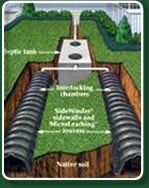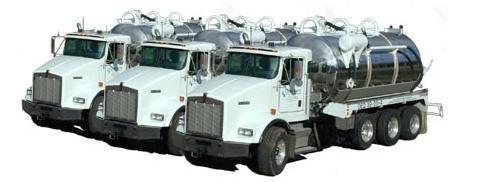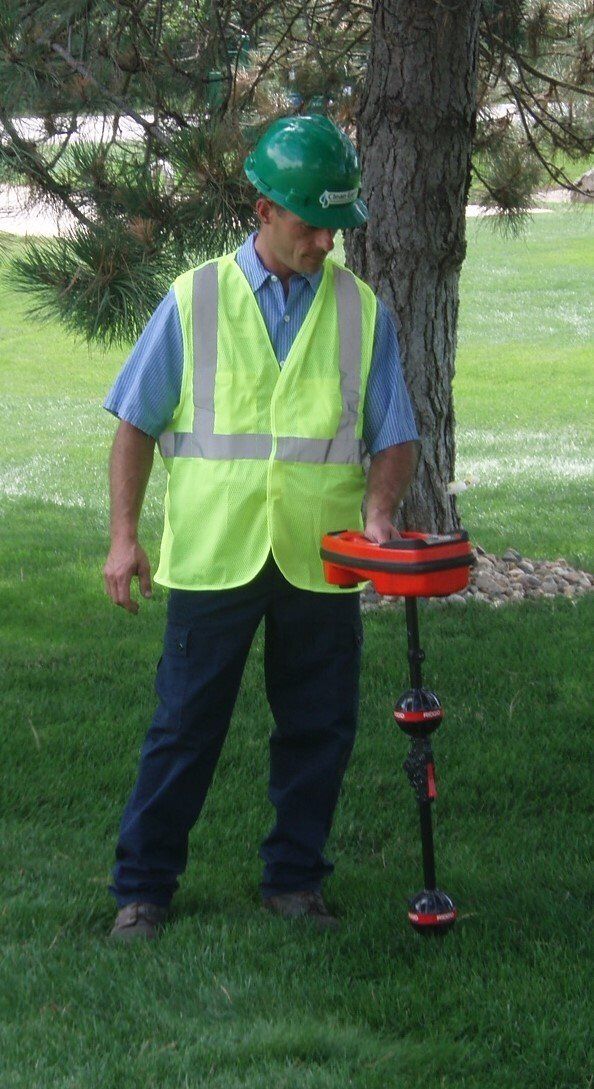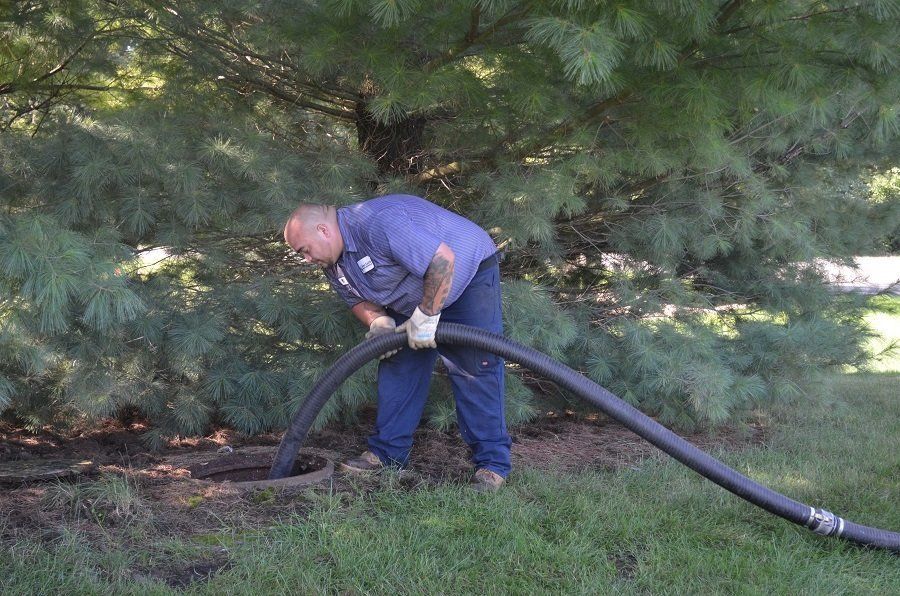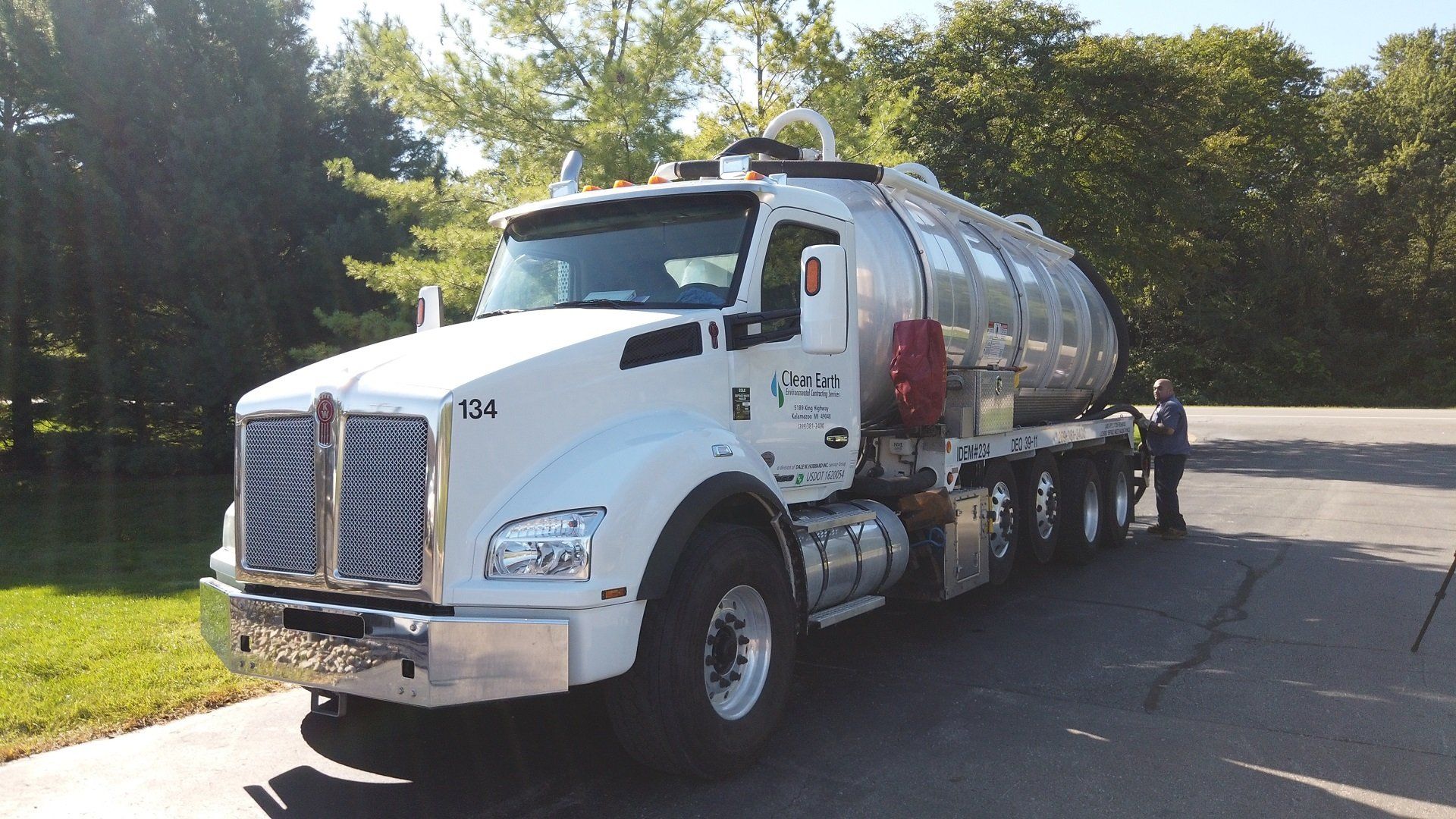Kalamazoo-Portage (269) 381-2400
Mattawan-Paw Paw (269) 657-2600
Richland-Gull Lake Area (269) 629-0900
Plainwell-Otsego-Allegan (269) 685-8100
Toll Free
(800) 232-8494
24/7 Septic Pumping
Fast Response Time
$20 Off Coupon
Responsible Care of the Environment
Septic Tank Maintenance,Cleaning & Inspection
Winter Is The Perfect Time For Septic Pumping!
"When our main lift station was inoperable, I called Clean Earth. With one phone call, my issues were resolved and a much bigger disaster was avoided. Clean Earth’s speedy response time eliminated the risk of contamination to the villages’ drinking water. Once again, we are pleased with the great job and your guys are always a pleasure to work with."
– Ken, Village of Vicksburg
"I appreciate our relationship with Clean Earth Environmental, as I can always depend on an immediate response. Your workers always go the extra mile to assure accuracy & efficiency and they always arrive on site with a positive attitude prepared for the task at hand. Clean Earth recognizes the importance of taking care of issues that have the potential to affect so many people if not handled rapidly. I have complete confidence in your staff. Thanks for a job well done!"
- Bruce, Portage Public Schools
Clean Earth serves residential, commercial and industrial customers in Albion, Allegan, Allendale, Bangor, Battle Creek, Bloomingdale, Bronson, Cassopolis, Charlotte, Clinton Village, Coldwater, Coloma, Comstock, Constantine, Coopersville, Delton, Dowagiac, Grand Ledge, Grand Rapids, Grandville, Hartford, Hastings, Holland, Ionia, Jackson, Kalamazoo, Kentwood, Lowell, Marcellus, Marshall, Mendon, Muskegon, Niles, Norton Shores, Oshtemo, Otsego, Parchment, Paw Paw, Plainwell, Portage, Richland, Saugatuck, Schoolcraft, South Haven, Spring Arbor, Springfield, Springport, St Joseph, Stevensville, Sturgis, Three Rivers, Vandalia, Vicksburg, Walker, Wayland, White Pigeon, Wyoming and Zeeland, Michigan (Mi.) We also serve customers in Elkhart, Granger, Michigan City, Mishawaka, Shipshewana and South Bend, Indiana (In.)
Clean Earth Environmental is a Division of Dale W. Hubbard, Inc. Service Group
Fast Emergency Service is Our Specialty
Get the help you need when you need it from the professionals at Clean Earth. Our technicians are available 24 hours a day, 7 days a week. Schedule service appointments at your convenience. We are Licensed & insured, and all our work is guaranteed.*
Septic Services
- Septic Tank & Drywell Pumping/Cleaning
- Septic System Repairs
- City Sewer Connections
- Lift Station Pumping/Cleaning
- Flooded Basement Vacuum Cleaned
- Electronic Septic System Location Service
- Neighborhood Discounts
How a Septic System Works
The more complete the decomposition of your household waste the more efficiently and trouble free a septic system functions.
When a septic system is overloaded or not properly maintained, the bacterial decomposition can slow or stop, causing untreated liquid and solid wastes to overflow into the soil. Excessive use of bleaches, disinfectants and caustic or acid drain cleaners also deters the bacterial action of the system, and greases and solids can build up until they choke the system and block the flow of the liquid into the soil. When this happens, the drainage field may have to be dug up and replaced – a costly undertaking.
In a typical septic system, household wastes – including discarded food scraps, laundry water, cooking oils and grease – flow to a watertight septic tank, where they are decomposed by bacteria.
Inside the tank, the majority of the waste decomposes into sewage water, while heavier solids settle to the bottom and accumulate as sludge. Other lighter particles – including grease and oil – rise to the surface and form a scum. The decomposed sewage water then flows from the tank, through a distribution box and into a drainage field – a series of perforated pipes laid below ground in a bed of gravel. The liquid leaches out through the gravel and is further purified as it percolates through the soil.
Septic systems cannot dispose of all the material that enters the system. Solids that are not broken down by bacteria begin to accumulate in the septic tank and eventually need to be removed. The most common reason for system failure is not having these solids removed on a regular basis. Seepage from inadequate or failing septic systems can contaminate both ground and surface waters. Malfunctioning septic systems are one of the leading causes of groundwater pollution.
Wastewater contains several undesirable pollutants. Pathogens such as viruses or bacteria can enter drinking water supplies creating a potential health hazard. Nutrients and organic matter entering waterways can lead to tremendous growth in the quantity of aquatic microorganisms. Metabolic activity of these microbes can reduce oxygen levels in the water causing aquatic life to suffocate.
Most septic systems are conventional systems that use gravity to distribute the effluent from the tank. When site conditions are not appropriate for a conventional system, other types of systems, such as low pressure distribution or mound systems are sometimes used.
Septic Tanks Typically Use One of Four Drainage System Designs to Dispose of Effluent:
- Drywells
Drywells are plastic or concrete perforated tanks for discharging effluent into large, fabric covered, gravel-filled holes: Leach Pits. Drywells are a passive (no pump) solution for small/odd lots where a long leach field is not possible or desired. Pits take advantage of surface area around sides to dispose of large amounts of water in the right soil and capability to accept large surges at one time.
- Drain Fields
Drain Fields are trenches (or rectangular beds) dug in yard and filled with 6' to 24"of gravel and a four inch diameter perforated pipe. The pipe-in-gravel drain line is covered with geo textile fabric (landscaping weed barrier) and then backfilled with sand and a 6" to 24" of native soil. Gravity sends effluent to the drain field (1/8 inch per foot drop minimum) and dispersed into soil evenly (drain field pipe is level).
- Stone Trenches
Stone Trenches are a system consisting of four inch pipes installed horizontally in 3' wide trenches.Typically an alternator valve divides the system of trenches in half. The pipes are installed on 6" to 24" of 6A stone as specified on the permit.The pipes are perforated to allow the effluent to drain on the stones and surrounding soil.More stone is placed around and onto the pipes, followed by a layer of filter fabric, than 6' to 24" of soil cover. Specific requirements vary with each permit.
- Pressurized Systems
Pressurized Systems make use of an electric pump to force effluent into mounds, trenches, beds or chambers. Even distribution of effluent is key to smaller drain field sizing and better treatment of the waste water. Poor soil percolation sites (high water table) often require pressure distribution sand mounds with two inch diameter pipe drilled with 1/4 inch holes every two feet, or so. Drip systems utilize small nozzles for even more uniform distribution of waste water.
- Alternator Valve
The Bull Run Alternator Valve is designed to alternate flows to different absorption areas of the sewage disposal system. Using a special tool at ground level, the homeowner switches the valve annually from one absorption area to another. The user has no contact with the waste water because the valve is leak proof.
Maintaining your septic system
Proper septic system maintenance will aid in avoiding costly and unnecessary expense.
Your septic system should be properly maintained to assure years of trouble free service.
Clean Earth recommends every 2-3 years as does the Kalamazoo County Environmental Health Department. Frequency may change depending on high household water usage and if there is a garbage disposal installed.
Failing septic systems can:
- Endanger your family's health.
- Pollute the environment
- Reduce your property value.
- Be expensive to repair.
Warning signs of septic system problems:
- Endanger your family's health.
- Pollute the environment
- Reduce your property value.
- Be expensive to repair.
You've spent thousands of dollars on your home and landscaping, lack of maintenance on your septic system will allow solid waste materials to flow into your drain field eventually clogging it.
Ways to Prolong the Life of Your System
There are many ways to prolong the life of your septic system and lengthen the period between pumping. Household water use directly controls how quickly waste travels through a conventional system. Wastewater that enters the tank requires time to allow the solids to settle to the bottom. The higher the volume of water that is introduced to the system, the less opportunity the wastewater has to settle in the holding tank and the less opportunity the bacteria have to break down the solids. Therefore, limiting the use of water in the home will go far in prolonging the life of the system
Reduce Household Water Use
- Use water-saving shower heads and faucet aerators.
- Install low-flow toilets.
- Repair leaking toilets (place a few drops of food coloring into the toilet tank to detect water leakage into the bowl).
- Make sure sump pumps and roof drains are not connected to the sewage system.
- Use front load washers and space out the time between washings.
Watch What Goes Down the Drain
Controlling what goes into the water that enters the system is just as important as reducing the amount of water that flows into the system.
- Use water-saving shower heads and faucet aerators.
- Install low-flow toilets.
- Repair leaking toilets (place a few drops of food coloring into the toilet tank to detect water leakage into the bowl).
- Make sure sump pumps and roof drains are not connected to the sewage system.
- Use front load washers and space out the time between washings.
Proper maintenance of your septic system begins by installing an effluent cartridge filter. The filter will warn you when your system needs attention.
Septic Tank Effluent Filters
- All New Zabel A100/300/600™ 12x20 Series Description The original Zabel® Disc Dam Filter was patented in 1959.The 12” series filters have been filtering septic tank effluent longer than any other filter in the wastewater industry.In 2000 Zabel made the best even better by introducing a complete redesign of the original with more great features and finer levels of filtration.In 2006, Polylok, Inc. redesigned the A100/300/600-12X20 merging the best of the Polylok line of filters with the best features of the Zabel line.This new innovative design is available with or without our patented Gas Deflector red Shut-off ball.
- Zabel A1800™ Series Description The Zabel® A1800™ Series filter is the choice for single-family residential applications. The cartridge type filter easily slides into your 4" sanitary tee baffle to provide optimal septic system protection by reducing Suspended Solids escaping into your drain field. The Zabel A1800™ Series filter is the best insurance available to provide long drain field life.
- PL-122 Effluent Filter Description The PL-122 was the first filter developed by Polylok. The biggest advantage of this filter is that it has an automatic shut off ball built into every filter. When the filter is removed for regular cleaning, the ball will float up and temporarily shut off the system so the effluent won’t leave the tank.It is also rated for 1,500 GPD (Gallons Per Day) and is NSF approved.
- All New Zabel A100/300/600™ 12x20 Series Description The original Zabel® Disc Dam Filter was patented in 1959.The 12” series filters have been filtering septic tank effluent longer than any other filter in the wastewater industry.In 2000 Zabel made the best even better by introducing a complete redesign of the original with more great features and finer levels of filtration.In 2006, Polylok, Inc. redesigned the A100/300/600-12X20 merging the best of the Polylok line of filters with the best features of the Zabel line.This new innovative design is available with or without our patented Gas Deflector red Shut-off ball.
Septic Tank Riser
Our septic tank risers provide for easy septic tank inspection and maintenance. Our Heavy Duty Covers are watertight, airtight and child proof. . Our technician will uncover your septic tank opening and install the riser for you. Risers can be installed in depths from 1’ to 15’. It’s a simple and affordable cost saving method for servicing your septic tank. If you are a do it yourselfer you can purchase materials from us to install on your own. Our staff would be happy to assist you and answer any questions you may have. Please call our office today for pricing. 15” to 18” Heavy Duty Cover & Adapter Ring for Corrugated Pipe.
Septic Inspection
Selling Your Home? We Uncover and Inspect Septic Systems for Real Estate/Mortgage Evaluations
Components of our Certified Septic System Inspection
- Examine inside the septic tank: Clean Earth certified inspectorsopen the tank, examine the inlet and outlet baffles and determine the volume of the treatment tank. The tank is then inspected for cracks, corrosion and leakage. We also verify that both baffles are in place. In addition, our inspectors also check the waste levels inside the septic tank.
- Inspect the conveyance system: Clean Earth certified septicinspectors examine the distribution box or alternator valve for leakage,cracks and corrosion. Our inspectors also make sure that the distribution box is level. Any cracks or corrosion will be identified.
- Check the Absorption Field: Clean Earth septic inspectorsvisually inspect pipes leading to the absorption/drain field. The inspection also includes a flow test where dye is introduced into the septic system. This test will simulate normal septic usage and enable our septic inspectors to observe drainage. Various points in the absorption area are uncovered allowing for proper inspection of the pipe and stone. Clean Earth inspectors visually inspect the surface area to locate signs of system backups and probe underground to check for drainage levels.
- Drinking water samples can also be drawn upon request and sent to our lab for analysis.
- Comprehensive and Easy to Read Reports: Our inspection provides WrittenReports stating clearly the overall condition of the septic system and what problems may be present. If a water analysis is required, the lab report will also be provided.
Septic Tank Locating
Clean Earth technicians have years of experience in locating septic systems. However, occasionally a septic tank is difficult to locate underground. When this problem occurs Clean Earth uses the latest technology in electronic locating devices. Our electronic locators can pinpoint the location of a septic tank through the use of a sonde device that is flushed down the toilet or mechanically inserted into the septic tank via the main line cleanout or another access point. A technician than uses the receiver above ground to receive the signal being transmitted via the sonde device in the septic tank.
Our Reviews

“Clean Earth has been to my house two days in a row and both days were wonderful. Yesterday I had Jeff at the house to pump out the septic, and today I had Ray and Tanner out to do an overall septic inspection. All three of them were very pleasant to work with. They were helpful in explaining what they were doing and the reasoning for what they were doing. Ray and Tanner even went above and beyond today.”
- Michael K.

“ Came out in the bitter cold and snow and assessed our septic problem and fixed it in a few hours. After they figured out the problem, they even had someone else bring out a part they needed so that we didn't have to have them come back at a later time. Everything they did was explained to us fully. Highly recommend them ”
- Annette A.

“Excellent experience from start to finish. Michelle was super helpful in scheduling and very clear on the process. CJ was the service professional and he was fantastic. He was incredibly considerate, knowledgeable, and took the time to answer questions and walk through options. I’m very pleased with the same day service and overall experience.”
- Jay J.
Licensing
Michigan DEQ Septage Transporters License #39-011 (Michigan Department of Environmental Quality)
Michigan DEQ Liquid Industrial Waste Transporters License MIH000000744
Michigan DEQ Disposal Site License MIP000000477
Kalamazoo County Septic System Installers License #09-013
Indiana DEM Permit #234 (Department of Environmental Management)
Service Areas
Albion, Allegan, Allendale, Bangor, Battle Creek, Bloomingdale, Bronson, Cassopolis, Charlotte, Clinton Village, Coldwater, Coloma, Comstock, Constantine, Coopersville, Delton, Dowagiac, Grand Ledge, Grand Rapids, Grandville, Hartford, Hastings, Holland, Ionia, Jackson, Kalamazoo, Kentwood, Lowell, Marcellus, Marshall, Mendon, Muskegon, Niles, Norton Shores, Oshtemo, Otsego, Parchment, Paw Paw, Plainwell, Portage, Richland, Saugatuck, Schoolcraft, South Haven, Spring Arbor, Springfield, Springport, St Joseph, Stevensville, Sturgis, Three Rivers, Vandalia, Vicksburg, Walker, Wayland, White Pigeon, Wyoming and Zeeland, Michigan (Mi.) We also serve customers in Elkhart, Granger, Michigan City, Mishawaka, Shipshewana and South Bend, Indiana (In.)
Phone Kalamazoo-Portage (269) 381-2400
Mattawan-Paw Paw (269) 657-2600
Richland-Gull Lake Area (269) 629-0900
Plainwell-Otsego-Allegan
(269) 685-8100
Toll Free (800) 232-8494
Email
schedule@ceenviro.com
Address 5189 King Hwy, Kalamazoo, MI 49048

